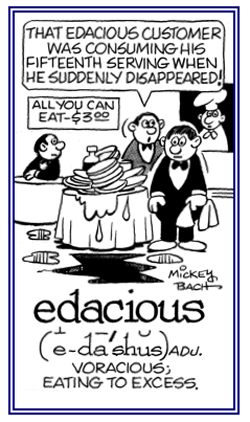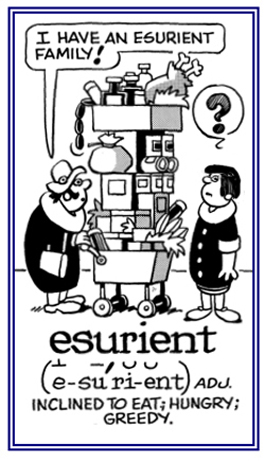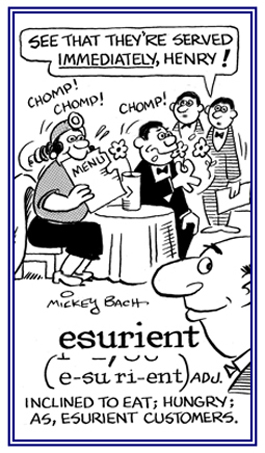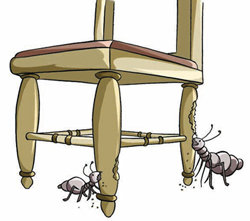ed-, edi-
(Latin: edere, "to bite, to eat; eating, eatable; consume")
eat (verb), eats; ate; eaten; eating
1. To take food into the mouth, to chew it, and then to swallow it: Marcus and Margaret are striving to maintain good health by being careful to eat healthy foods and not eat too much.
3. To destroy by corroding or wearing away: Jim was told that the acid he was using to clean the rust spots on his car eats metal; so, he should be careful that he doesn't use too much of it or spill any of it on other parts of the surface of his vehicle.
4. Etymology: from Indo-European ed-, "eat" which produced the basic word for "eat" in many European languages.
Another word that means to eat is "to consume food".
When William's little girl wanted more dessert, he told her that she had eaten enough.
2. To gnaw or to or to devour: While the Oliver family was on vacation, termites had eaten some of their wooden furniture.3. To destroy by corroding or wearing away: Jim was told that the acid he was using to clean the rust spots on his car eats metal; so, he should be careful that he doesn't use too much of it or spill any of it on other parts of the surface of his vehicle.
4. Etymology: from Indo-European ed-, "eat" which produced the basic word for "eat" in many European languages.
From Greek edein and Latin edere, "to eat".
eatable (adjective), more eatable, most eatable
Referring to something that is safe to eat: People have to be careful that they have eatable food to consume because there are some things that simply are too unhealthy for them to devour.
edacious (adjective), more edacious, most edacious
A reference to craving or devouring food in great quantities; voracious: Ed had an edacious appetite and people thought he was piggish because he ate so much whenever he was eating.

© ALL rights are reserved.
Go to this Word A Day Revisited Index

Go to this Word A Day Revisited Index
so you can see more of Mickey Bach's cartoons.
1. An abnormal appetite; greediness; gluttony; an excessive desire to eat: When Sam ate anything, his edacity always shocked people who were near him because he was gobbling a lot of food as if he were starving.
2. Etymology: from Latin edere, "to eat".
2. Etymology: from Latin edere, "to eat".
That which is suitable or safe for eating: People need to be aware of the edibilities of healthy foods and to be careful of the those that are unhealthy.
edible (adjective), more edible, most edible
1. That which is fit or safe to consume; especially, by humans: Sam was at the outdoor market on Saturday, looking for some edible fruits and vegetables for his family.
2. Etymology: borrowed from Late Latin edibilis and from Latin edere, "to eat".
2. Etymology: borrowed from Late Latin edibilis and from Latin edere, "to eat".
edibles (plural used as a singular) (noun)
Food that is available for snacking or ingesting: When Fred's friends came to his birthday party, they had a variety of edibles available; including, cakes, cookies, ice cream with strawberries, etc.
A condition in which people desire and consume great quantities of food: The bad results of esuriencies are that too many people overeat and endanger their lives because of their unhealthy gorging.
esurient (adjective), more esurient, most esurient
1. Pertaining to being very hungry for food: When the esurient customer went to the restaurant, he ordered three large triple-deck cheeseburgers with French fries, and other ingredients; plus two milk shakes for his lunch.
2. A reference to being greedy for gain or loot; rapacious: The esurient thieves were plundering the apartment building and taking large amounts of money, jewelry, and anything of value that could be easily sold for cash.
3. Excessively or ardently desirous of something: Henry had esurient objectives to become the next president of his company.
4. Etymology: from Latin ensurie, "to be hungry"; literally, "to want to eat"; which came from Latin edere, "to eat".

© ALL rights are reserved.

© ALL rights are reserved.
Go to this Word A Day Revisited Index
2. A reference to being greedy for gain or loot; rapacious: The esurient thieves were plundering the apartment building and taking large amounts of money, jewelry, and anything of value that could be easily sold for cash.
3. Excessively or ardently desirous of something: Henry had esurient objectives to become the next president of his company.
4. Etymology: from Latin ensurie, "to be hungry"; literally, "to want to eat"; which came from Latin edere, "to eat".


Go to this Word A Day Revisited Index
so you can see more of Mickey Bach's cartoons.
esuriently (adverb), more esuriently, most esuriently
Relating to an excessive or abnormal desire for food: More and more people are esuriently ingesting too much and ending up overweight.
That which is not eatable or not safe to be eaten: There are all kinds of vegetation that animals can safely consume but which are inedibilties for human beings.
inedible (adjective) (not countable)
1. A reference to anything that is not appropriate, worthy, or safe to eat: Inedible victuals are those that are uneatable, poisonous, dangerous, or indigestible; such as, burnt toast, rancid or spoiled meat, spoiled milk, etc.
Some mushrooms are edible; however, toadstools are inedible; eggs can be eaten, but the shells are inedible.
2. Etymology: unfit to eat; from Latin in-, "not, opposite of" + Latin edible, "eatable"; from Latin edere, "to eat".
inedibly (adverb) (not countable)
Relating to foods that cannot be ingested; especially, by human beings: Although wood is an inedibly natural product for people, termites and carpenter ants find such material very edible for their survival.


<img src="/img/left_arrow_sm.gif" alt="" /> <img src="/img/right_arrow_sm.gif" alt="" />
Showing 1 page of 13 main-word entries or main-word-entry groups.
